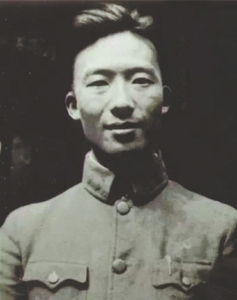
Guangweiran in Wuhan in 1938 and Guangweiran in Wuhan in 1938.
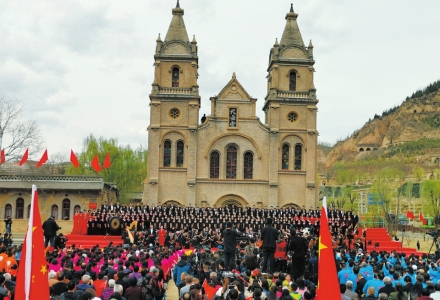
The Yellow River search group is in Yan ‘an.
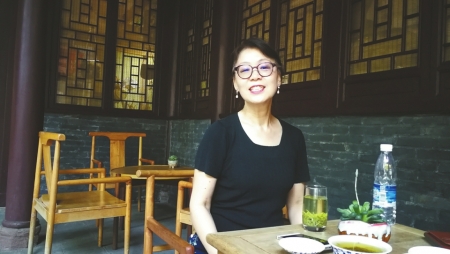
Zhang Andi, the daughter of Guangweiran, was interviewed by Huaxi Dushi Bao and cover journalist.
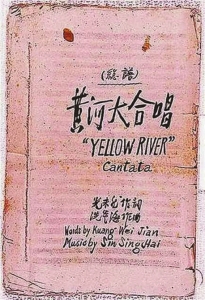
The Yellow River Cantata’s music score.
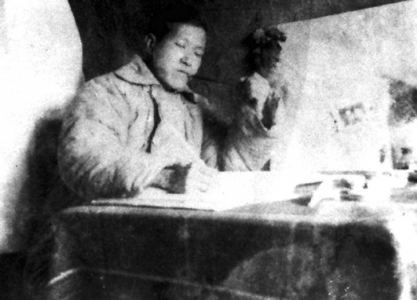
Xian Xinghai created The Yellow River Cantata.
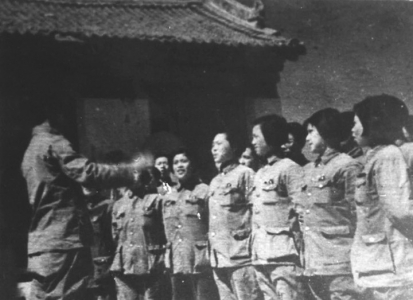
Eighty years ago, Wu Xiling conducted the Yellow River Chorus.
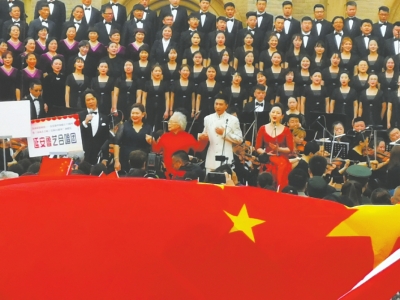
The visiting group sang The Yellow River Cantata.
Defend the yellow river
(The Yellow River Cantata’s seventh movement)
The wind is howling.
The horse is barking.
The Yellow River is roaring.
The Yellow River is roaring.
Hexi hills are towering high.
Hedong Hebei
Sorghum is ripe.
Among the mountains
There are many anti-Japanese heroes.
Qingshazhangli
Guerrilla athletes are heroic.
Picked up a local gun and a foreign gun
Waving broadsword and spear
Defend hometown
Defend the yellow river
Defend North China
Defend all China.
Roar, Yellow River
(The Yellow River Cantata’s eighth movement)
Roar, Yellow River!
Roar, Yellow River!
Roar, Yellow River!
Set off your angry waves,
Let out your barking!
To people all over the world,
Sound the alarm for battle!
Ah — —
A nation of 5,000 years,
What a lot of suffering!
People under the iron hoof,
I can’t stand the pain
Can’t stand it!
But,
New China has dawned;
450 million people have United,
Swear to the death to protect the homeland!
Listen, listen, listen:
Songhua River is calling,
Heilongjiang is calling;
The Pearl River issued a heroic cry;
On the Yangtze River,
Burning all over the anti-Japanese bonfire!
Ah! Yellow River!
Roar! Roar! Roar!
To the suffering people all over China,
Sound the alarm for battle!
To the working people all over the world,
Sound the alarm for battle!
To the working people all over the world,
Sound the alarm for battle!
To the working people all over the world,
Sound the alarm for battle!
To the working people all over the world,
Sound the alarm for battle!
Huaxi Dushi Bao-cover journalist Wu Deyu
"The wind is roaring, the horse is barking, and the Yellow River is roaring … …” The Yellow River Cantata, whose lyrics are written by Guangweiran and composed by Xian Xinghai, is a great hymn of national spirit. The Yellow River Cantata began to sing in northern Shaanxi in the spring of 1939, and like a prairie fire, it quickly spread all over China, inspiring Chinese sons and daughters to fight bloody battles. It has been sung for 80 years, and it still echoes in the hearts of Chinese children.
On April 13th, 2019, on the 80th anniversary of the The Yellow River Cantata premiere, Zhang Andi, the daughter of the lyricist Guangweiran (also known as Zhang Guangnian), and the descendants of the third team members of the anti-Japanese drama team who had experienced that period of gunpowder smoke, formed a Yellow River visiting group and went to Yichuan, Loess Plateau, Hukou Waterfall and Yan ‘an in succession to find and relive The Yellow River Cantata’s creative path. A few days ago, Huaxi Dushi Bao and the cover journalist interviewed Zhang Andi, the daughter of Guangweiran, and listened to her talk about the tortuous birth of this classic.
eventful years
"If my father hadn’t broken his arm, there might have been no The Yellow River Cantata."
When Guangweiran created The Yellow River Cantata, it coincided with the second cooperation between the Kuomintang and the Communist Party. Guangweiran led the third team of anti-enemy drama to express condolences to the anti-Japanese soldiers and civilians in the guerrilla zone of Luliang Mountain. When crossing the Yellow River to the east near Hukou in Yichuan County, Shaanxi Province, and crossing the Yellow River to the west by boat from Yonghe Pass in Yonghe County, he witnessed the scene of the Yellow River trackers fighting against the violent wind and waves, and listened to the melodious boatman’s horn, so he created a long poem "Yellow River Ode" that described the national suffering, struggle and bright future.
In January 1939, he was sent to Yan ‘an because his arm was broken, and he recited this work at the New Year’s Eve party that year. Xian Xinghai was very excited after hearing this, and said that he would create The Yellow River Cantata for the drama team. In March of the same year, in a crude earthen kiln in Yan ‘an, Xian Xinghai kept writing for six days, and finished The Yellow River Cantata’s composition on March 31st. The Yellow River Cantata, known as "the strongest voice of the times when the nation is in danger", is a landmark work of Chinese culture, which has inspired generations of Chinese sons and daughters to strive for self-improvement. Andy Zhang said: "There is a certain contingency in The Yellow River Cantata’s creation, but the contingency is full of inevitability. If my father hadn’t broken that arm, there might not be The Yellow River Cantata. Because he wouldn’t have been sent to Yan ‘an, and he wouldn’t have seen his old friend Xian Xinghai. "
Regarding The Yellow River Cantata, Andy Zhang disclosed a detail — — "Xian Xinghai Diary" is very simple: "Look at the light before it happens, hospital." In Andy Zhang’s view, "When Xian Xinghai went to see Guangweiran, they should have discussed the idea of co-creating a large-scale work. Because my father’s final "Ode to the Yellow River" was written according to the movement. "
Wu Xiling, the premiere conductor of the Auditorium of Northern Shaanxi Public College, recalled that he was "very excited"
In a video interviewed before Guangweiran’s death, he recalled: "Everyone listened to me recite The Yellow River Cantata’s poems, and I read this lyric from beginning to end. Of course, everyone applauded me warmly. Xinghai sat by the side and listened attentively. When he heard the last sentence, he suddenly stood up and ran to me, grabbing the manuscript, ‘ I am sure to write it well ’ 。” On April 13th, 1939, The Yellow River Cantata premiered in the Auditorium of Northern Shaanxi Public College, which caused great repercussions. Wu Xiling, the conductor, recalled before his death: "Because all the people in our team crossed the Yellow River, when we sang this song, we had that life and that scene. When we sang at that time, we were very excited. " Because the arm was injured and bandaged, Guangweiran was wearing a big cloak, which covered the injured arm. After that, the bare arm has never recovered, and the arm can only be straight and cannot be bent.
"Eighty years ago, my father and Xian Xinghai created The Yellow River Cantata, which premiered in 1939. This is a very remarkable thing. Eighty years later, we sang all the tracks of this work here again, which is particularly memorable. It is also the first time for us to go to Yan’ an to find the old site. I am so excited. "
Searching for the Yellow River
Later generations revisited the road of creation and sang all the tracks on the edge of the Yellow River.
On the occasion of the 80th anniversary of The Yellow River Cantata’s performance, Zhang Andi and his younger brother Zhang Andong, together with the descendants of the third anti-Japanese drama team who had experienced that period of gunpowder smoke, and the workers who promoted and studied the Yellow River Chorus, formed a Yellow River search group with more than 50 people to relive The Yellow River Cantata’s creative road. The concert celebrating the 70th anniversary of the founding of New China and commemorating the 80th anniversary of The Yellow River Cantata’s premiere, from Hukou Waterfall to Yan ‘an, was impressive. Zhang Andi said that the visit was planned for more than two years, and many people from home and abroad participated. The Australian Navita Yellow River Choir, Northwest University for Nationalities Choir and Symphony Orchestra undertook The Yellow River Cantata’s singing and accompaniment.
"Eighty years ago, my father and Xian Xinghai created The Yellow River Cantata, which premiered in 1939. This is a very remarkable thing. Eighty years later, we sang all the tracks of this work here again, which is particularly memorable. It is also the first time for us to go to Yan’ an to find the old site. I am so excited. " Zhang Andi said.
Andy Zhang immigrated to Australia for more than 30 years. There is a Yellow River Choir in Australia. In 2000, The Yellow River Cantata’s eight movements were rehearsed for the first time and premiered at the Sydney Opera House. It was also the first time that she practiced the suite from beginning to end. Before that, she could only sing Defending the Yellow River and Huangshui Ballad. "Now, everything can be memorized without music."
This 80th anniversary tour, after a year of preparation, added innovative elements on the basis of the original. For example, the recitation of the chapters of "how the Yellow River’s waters move out of heaven" will be changed from two people at most to many people. In order to ensure the performance level, the choir invited Tu Shanxiang, a pipa master living in China, Qu Xianhe, a famous Japanese recitator, and Rafael, the former tenor of Queensland Opera House, to join the performance.
"In Yonghe County, Shanxi Province, the scenery is particularly good, and there is a giant sculpture of how the Yellow River’s waters move out of heaven written by my father. The biggest performance on April 13th was the Yellow River Choir and Northwest University for Nationalities Choir, plus the band, with a total of more than 300 people. It was spectacular and we were particularly excited. "
When performing in Yonghe County, the Yellow River Choir collectively donated 24,000 yuan, hoping that the local government would set up a juvenile Yellow River Choir to inherit this spirit.
Zhang Andi went to the Northeast Heilongjiang Production and Construction Corps at the age of 15. A few years later, when he returned to Beijing to see his father again, he didn’t say much. He just said, "My daughter has grown up." Then he made a long list of books and said to Zhang Andi, "These books need to be read."
Poet’s father
I often stay up late to write articles, and I don’t talk much and communicate with my children.
After returning from Yan ‘an, Zhang Andi and his party visited Du Fu Caotang, Wuhou Temple, Dujiangyan and Qingcheng Mountain, and then went to Siguniang Mountain, Danba Tibetan Village and Kangding. There is a panda valley not far from Qingcheng Mountain, with beautiful environment and few tourists. Being able to see the pandas at such a close distance makes them scream. Walking in Du Fu Caotang and Wuhou Temple, Zhang Andi was deeply intoxicated. The grass and trees here, ancient charm and poetry made her linger. Zhang Andi said: "There are thousands of years of culture and full of cultural atmosphere. It’s good to sit quietly here when you have time."
During the interview, Andy Zhang played a recording for the reporter, which was the original sound of Mr. Guangweiran reciting The Yellow River Cantata at Peking University in 1957, accompanied by three strings. His voice is a little bit of Hubei dialect, but it is clear and charming. At that time, Guangweiran was 44 years old.
Andy Zhang said: "He (father) likes to recite poems. As soon as he came into contact with the Yellow River, his inspiration was aroused." In Zhang Andi’s memory, when she was a child, her father was very busy and often stayed up late to write articles, so there was not much communication between father and daughter. There are many books at home.
Zhang Andi went to the Northeast Heilongjiang Production and Construction Corps at the age of 15. A few years later, when he returned to Beijing to see his father again, he didn’t say much. He just said, "My daughter has grown up." Then he made a long list of books and said to Zhang Andi, "These books need to be read." My father is always a poet, and he doesn’t talk much, but his heart is like a mirror.
Zhang Andi was admitted to the university later, and only went home on weekends. After graduating from the university, he went abroad.
On the contrary, in his later years, he had more communication with his children. He has been writing to Andy Zhang seriously, and letters between father and daughter keep coming and going. "Very concerned about us."
Zhang Andi specifically mentioned that his father in his later years was very interested in all new things and especially loved chatting with young people. A person in the Yellow River search group was Zhang Andi’s younger brother Zhang Andong’s childhood partner. He recalled that his parents were not around when he was a child. He liked literature and often chatted with uncle Guangweiran when he had the opportunity. During that time, he benefited a lot in his life.
From this story, Zhang Andi seems to feel the state of mind of his father when he was separated from his children.
During this visit, Zhang Andi saw Hukou and the Loess Plateau. Especially in Yichuan, she was very excited to sing The Yellow River Cantata in front of Hukou Waterfall. Although the Yellow River Chorus has changed a lot, every new entrant will rehearse nervously before the performance and be infected by her spirit. Andy Zhang always believes that where there are Chinese, there must be The Yellow River Cantata.
■ The Birth of Revolutionary Songs
Tang Shangcun wrote "No communist party, No New China"
A single spark can start a prairie fire Cao Huoxing, a 19-year-old youth, wrote a classic song — — "Without communist party, there would be no new China", a song that inspired thousands of war-torn China people in Qian Qian at that time.
In 1940, Cao Zhi entered North China United University to study music. In order to express his determination to fight the Japanese War to the end and not be afraid of sacrifice, he changed his name to "Cao Mars". In 1943, he created his masterpiece "No communist party, No New China". Cao Huoxing wrote more than a thousand songs in his life, and is known as "People’s Musician". His main representative works include "Song of Exploration Workers" and "People’s Love by the People’s Premier".
Cao Huoxing is a native of Xigangnan Village, Pingshan County, Hebei Province. Although he was born in a peasant family, his father and eldest brother both received secondary education, and the village primary school teacher was a Communist party member. He was influenced by progressive thoughts to a certain extent since he was a child.
Shortly after the start of War of Resistance against Japanese Aggression in 1937, 13-year-old Cao Huoxing was admitted to Baoding Middle School, and the Japanese invaders set foot along the Pinghan Railway. He dropped out of school and returned to his hometown to join the revolutionary mass organizations and served as the director of the Youth Salvation Association in his village.
After the Spring Festival in 1938, Cao Huoxing went to work in Pingshan County Farmers’ Association. In April and May of the same year, he was transferred to the Iron Blood Drama Club, the propaganda team of Pingshan County Youth Salvation Association. This propaganda team was the predecessor of the mass drama club in the Shanxi-Chahar-Hebei border area.
With the expansion of the influence of the drama club, the party organization sent the members of the drama club to study at the School of Literature and Art of North China United University. Cao Huoxing cherishes this hard-won learning opportunity. He is modest and studious and has made great progress. In 1943, 19-year-old Cao Huoxing was the head of the music group of the mass drama club of the Anti-Japanese and National Salvation Federation in the Shanxi-Chahar-Hebei Border Region. In order to counter the "mopping-up", the mass drama club was broken into parts, and went deep into the masses to carry out literary and artistic activities and publicize the party’s anti-Japanese proposition. Thus, there was a trip to the village by Cao Mars and his teammates. After Cao Huoxing and his teammates arrived in the village, they wrote anti-Japanese slogans on weekdays, organized the village’s literary propaganda team to sing and rehearse, and engaged in creation. Often his teammates are asleep, and Cao Huoxing still devotes himself to composing lyrics and songs under the horseshoe lamp. He recalled the days when he was with everyone in the drama club before and felt the warmth of living in the revolutionary ranks; Reminiscent of the situation witnessed by the broad masses of people in the anti-Japanese base areas, under the leadership of communist party, who overcame all kinds of difficulties and persisted in the war of resistance, an editorial article in Yan’ an Liberation Daily, which I read a few days ago, suddenly popped out of my mind — — Without communist party, there would be no China. "Without communist party, there would be no China … … He persisted in the war of resistance for more than six years, and he improved the people’s lives. He built a base area behind enemy lines, and he practiced democracy with many advantages … …” Cao Mars was full of emotion and wrote these words on paper. After repeated revisions,There is no China without communist party. Later, with the pace of the liberation army going south, this song spread all over China. After the founding of New China, one day in 1950, Mao Zedong heard his daughter Li Ne sing "Without communist party, there would be no China" in Zhongnanhai, which he thought was inaccurate, because China had a history of thousands of years, with China first and communist party later. Therefore, the word "new" should be added before "China", that is, "there will be no new China without communist party", which is in line with historical facts. Since then, there has been a classic melody that has been passed down to the present.
Comprehensive related reports
■ patriotic song creation
My People,My Country
Write this famous song in 20 minutes.
"My motherland and I can’t be separated for a moment. Wherever I go, there is a hymn … …” Whenever this fiery and beautiful melody of My People,My Country rings, people’s hearts are filled with a sacred feeling that will never change. How was this song created? "A song usually has words before songs, but My People,My Country has words before songs." Qin Yongcheng, a famous songwriter, remembers My People,My Country’s writing background very clearly. "In 1985, my fellow Dalian countryman Zhang Li called me and said ‘ I like your "Poem on the Seaside" very much, and the melody is beautiful. I hope to write lyrics for it, but it’s an instrumental piece of music, and it’s not well written. Can you create another one with the same mood, but the melody can’t be the same? ’ At that time, I happened to be studying in Beijing Central College of Education Administration. One afternoon, Zhang Li invited me to dinner at home. It was after 5 pm when I arrived at his home, and I began to think about melody, not ‘ Uplink ’ Melody ‘ 51235… … ’ But ‘ Downlink ’ ‘ 56543215… … ’ Unexpectedly, I found the main theme at once, and in less than 20 minutes, the music was created."
After many years, the lyricist Zhang Li recalled the scene in his memoirs and said, "In 1985, when Qin Yongcheng wrote the song, I couldn’t write the lyrics that satisfied me for a long time." Zhang Li put the music in her pocket for half a year. On a business trip to Guangxi, he opened the window the next morning and looked far away. A rising sun rose slowly, reflecting the mountains and rivers across the street picturesque. Reminiscent of the road I have traveled, although it is tortuous, it is closely linked to the fate of the motherland after all. This situation suddenly inspired him, and Zhang Li blurted out: "My motherland and I can’t be separated for a moment." Like a stroke of genius, he felt that he had found it. He wrote again with great enthusiasm: "Wherever I go, a hymn &hellip flows out; …” Qin Yongcheng, the songwriter, said that he liked the second lyric best: "My motherland and I are like a sea and a spray. The wave is the son of the sea, and the sea is the support of the wave … … Here, the relationship between the individual and the motherland is likened to the relationship between the waves and the sea. This metaphor has never been seen before. It is both profound and connotative, and the description is also very beautiful. "
After writing My People,My Country’s lyrics, Qin Yongcheng put it into a tape with 14 songs. He said, "The record company gave this tape to Li Guyi, the most popular singer at that time. Li Guyi said at that time ‘ I like this song by My People,My Country best ’ . Unsurprisingly, this song was sung by Li Guyi and spread. " From beginning to end, there is not a brave confession in the song, but through the poetic artistic conception of rivers, mountains, smoke, sea, waves and clear waves, people express their love for the motherland with beautiful images.
Comprehensive related reports